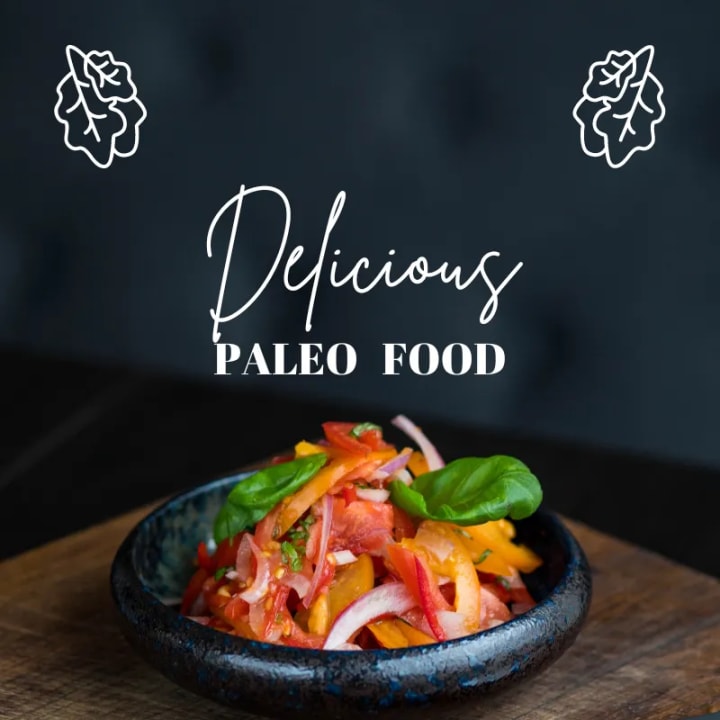The Paleo Diet: A Journey to Optimal Health
Achieve Weight Loss Success with the Paleo Diet

Introduction
Are you tired of traditional diets that promise miraculous results but fail to deliver? Look no further than the revolutionary Paleo Diet! This groundbreaking eating plan has gained popularity for its ability to help people shed pounds, boost energy levels, and transform their lives.
By following a diet inspired by our ancestors, you can tap into your body's natural mechanisms and achieve optimal health.
In the quest for better health and overall well-being, many individuals are turning to the Paleo diet as a lifestyle choice. The Paleo diet, also known as the Paleolithic diet or caveman diet, emulates the eating patterns of our ancestors from the Paleolithic era.
This article will delve into the intricacies of the Paleo diet, explaining its principles, benefits, and how to incorporate it into your daily life.
What is the Paleo Diet?
The Paleo diet is a dietary approach that emphasizes consuming whole, unprocessed foods that our Paleolithic ancestors would have eaten. The core idea behind the diet is to eliminate modern processed foods and focus on nutrient-dense options.
The belief is that our bodies are genetically adapted to thrive on the foods available to our ancestors, leading to improved health and a reduced risk of chronic diseases.
Origins of the Paleo Diet
The Paleo Diet draws inspiration from our ancestors, who thrived on a hunter-gatherer lifestyle thousands of years ago. Back then, our predecessors didn't have access to processed foods or modern agricultural practices.
Instead, their diet primarily consisted of whole foods such as lean meats, fish, fruits, vegetables, nuts, and seeds. By adopting a similar approach, the Paleo Diet aims to align our eating habits with our genetic makeup and promote overall well-being.
The Basic Principles of the Paleo Diet
The Paleo diet revolves around the concept of eating foods that were abundant during the Paleolithic era. Here are the key principles of the Paleo diet:
Whole Foods: The diet emphasizes whole, unprocessed foods such as lean meats, fish, fruits, vegetables, nuts, and seeds.

Elimination of Processed Foods: Processed foods, grains, legumes, refined sugars, and vegetable oils are avoided, as they were not part of our ancestors' diet.
Emphasis on Healthy Fats: Healthy fats from sources like avocados, olive oil, coconut oil, and nuts are encouraged.
High Protein Intake: The Paleo diet promotes a higher intake of protein, which helps in muscle growth and satiety.
Limited Carbohydrates: While the diet discourages refined carbs, it allows for carbohydrates from fruits and vegetables.
Foods to Eat on the Paleo Diet
On the Paleo diet, you can enjoy a variety of wholesome and nutritious foods. Here are some examples:
Lean meats such as chicken, turkey, and grass-fed beef.
Fish and seafood rich in omega-3 fatty acids, such as salmon and sardines.
Fresh fruits and vegetables, including berries, leafy greens, and cruciferous vegetables.
Eggs from free-range or organic sources.
Nuts and seeds like almonds, walnuts, chia seeds, and flaxseeds.
Healthy fats from avocados, coconut oil, and olive oil.
Foods to Avoid on the Paleo Diet
To adhere to the principles of the Paleo diet, it's important to avoid certain foods, including:
Grains such as wheat, rice, and oats.
Legumes, including beans, lentils, and peanuts.
Dairy products like milk, cheese, and yogurt.
Refined sugars and artificial sweeteners.
Processed foods and snacks.
Vegetable oils like soybean oil and corn oil.
Alcohol and sugary beverage
Benefits of the Paleo Diet
The Paleo diet offers several potential benefits for those who adopt it as a lifestyle choice:
Weight Loss: The emphasis on whole foods and the elimination of processed options can contribute to weight loss and improved body composition.
Improved Energy Levels: By fueling the body with nutrient-dense foods, the Paleo diet may provide sustained energy throughout the day.
Reduced Inflammation: The diet's focus on anti-inflammatory foods can help alleviate inflammation in the body, potentially reducing the risk of chronic diseases.
Enhanced Nutrient Intake: The consumption of fruits, vegetables, and healthy fats can provide a wide range of essential nutrients.
Balanced Blood Sugar Levels: By avoiding refined sugars and processed carbohydrates, the Paleo diet can help stabilize blood sugar levels.
Is the Paleo Diet Suitable for Everyone?
While the Paleo diet has gained popularity, it may not be suitable for everyone. It's essential to consider individual needs and consult with a healthcare professional before making any significant dietary changes.
Certain groups, such as pregnant or breastfeeding women, athletes with high energy demands, and individuals with specific health conditions, may require adjustments or modifications to the diet.
Tips for Following the Paleo Diet Successfully
To successfully adopt the Paleo diet, consider the following tips:
Plan Ahead: Plan your meals and snacks in advance to ensure you have suitable options readily available.
Focus on Whole Foods: Prioritize fresh, whole foods and minimize reliance on processed alternatives.
Experiment with Recipes: Explore new recipes and cooking techniques to keep your meals interesting and enjoyable.
Stay Hydrated: Drink plenty of water throughout the day to support overall health and well-being.
Seek Support: Join online communities or find local groups of individuals following the Paleo diet for support and recipe ideas.
Incorporating Exercise with the Paleo Diet
Physical activity is a vital component of a healthy lifestyle. When following the Paleo diet, consider incorporating exercise to maximize its benefits.

Engage in a combination of cardiovascular exercises, strength training, and flexibility exercises. Find activities you enjoy to stay motivated and make exercise a regular part of your routine.
Paleo Diet Success Stories
Numerous individuals have experienced positive outcomes with the Paleo diet. These success stories often involve weight loss, increased energy levels, improved digestion, and enhanced overall well-being.
While individual results may vary, exploring success stories can provide inspiration and motivation on your own journey.
Addressing Common Concerns about the Paleo Diet
The Paleo diet has faced criticism and concerns from various perspectives. Let's address some common concerns:
1. Lack of Whole Grains: The exclusion of grains is a point of contention, as they provide important nutrients. However, the Paleo diet emphasizes obtaining those nutrients from alternative sources like fruits, vegetables, and nuts.
2. Dairy Exclusion: Dairy products are avoided on the Paleo diet due to lactose intolerance and potential allergenic properties. However, calcium and other nutrients found in dairy can be obtained from non-dairy sources like leafy greens and fortified plant-based milks.
3. Sustainable Food Choices: Critics argue that the Paleo diet may not be sustainable due to the high demand for animal products. It's important to prioritize sustainable farming practices and choose ethically sourced animal products or explore plant-based alternatives.
4. Individual Variations: Every individual's dietary needs and tolerances vary. It's crucial to listen to your body and make adjustments to the Paleo diet to ensure it meets your unique requirements.
Debunking Myths Surrounding the Paleo Diet
The Paleo diet has been subject to various misconceptions. Let's debunk some common myths:
1. It's a Meat-Only Diet: While the Paleo diet emphasizes animal protein, it also emphasizes fruits, vegetables, and healthy fats. It's a misconception that the diet is solely focused on meat consumption.
2. It's a High-Fat Diet: While the Paleo diet does include healthy fats, it's not inherently high in fat. The emphasis is on choosing quality fats from sources like avocados, nuts, and olive oil.
3. It's Difficult to Follow: Like any dietary change, the Paleo diet may require adjustment. However, with proper planning, recipe exploration, and support, it can be an enjoyable and sustainable lifestyle choice.
Scientific Research and Studies on the Paleo Diet
Numerous scientific studies have investigated the potential benefits of the Paleo diet. While more research is needed, some studies suggest that the diet may contribute to weight loss, improved glucose control, and reduced inflammation.
It's important to stay updated with current research and consult with healthcare professionals for personalized advice.
The Paleo Diet and Sustainability
Sustainability is a growing concern in dietary choices. The Paleo diet can be adapted to promote sustainability by choosing ethically sourced, locally produced, and organic foods.
Additionally, incorporating more plant-based options and supporting regenerative farming practices can contribute to a sustainable approach to the diet.
Conclusion
The Paleo diet is a lifestyle choice that embraces the principles of consuming whole, unprocessed foods similar to those consumed by our Paleolithic ancestors.
By eliminating processed foods and focusing on nutrient-dense options, individuals can potentially improve their overall health and well-being. However, it's important to consider individual needs, consult with healthcare professionals, and make adjustments to ensure a balanced and sustainable approach to the diet.
For More Information Visit : www.foodandhealthzone.com
About the Creator
Jovita . M
Welcome to my page! Here, you'll find a captivating collection of thought-provoking articles that aim to entertain, inspire, and ignite your imagination. I strive to deliver content that leaves you craving for more knowledge.





Comments
Jovita . M is not accepting comments at the moment
Want to show your support? Send them a one-off tip.